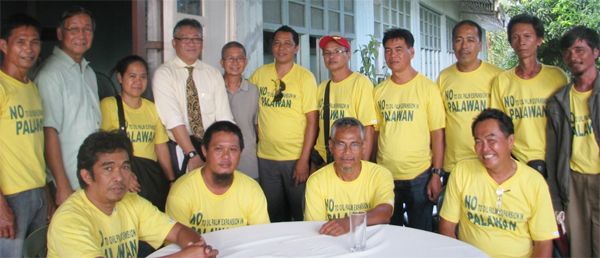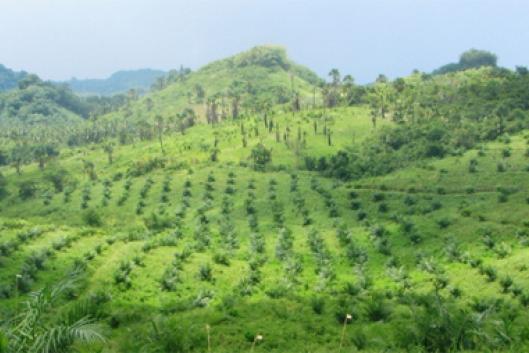Disponible uniquement en anglais.
Joint IPs/Farmers Coalition Hits Oil Palm Expansion in Palawan
A press release by the Coalition against Land Grabbing (CALG), 13 October, 2014
Ramon Paje’s proposal to convert 8 millions of Philippine soil into oil palm plantations has made headlines across the country (http://news.mongabay.com/2014/0603-philippines-palm-oil.html), and has shed some light on how the secretary of the Department of Environment and Natural Resources (DENR) conceive development for his own country. Palawan, also known as the ‘Philippine’s Last Frontier’, is in the period of witnessing one of the biggest conversation of lands into oil palm estates. As agro-business firms push through into the last ecological frontier of the Philippines, indigenous peoples and farmers try to halt them in various ways. One of their most recent moves has been the submission of a petition calling for a moratorium on oil palm expansion province wide. The petition signed by more than 4,200 farmers and indigenous peoples was submitted on 29 September to Dennis Socrates, Palawan Vice-Governor, by the members of the newly established Coalition against Land Grabbing (CALG). CALG members were introduced to Vice-Governor by Bishop Pedro Arrigo who personally endorsed the petition. He said “this petition comes directly from the very people who have suffered the environmental and social consequences of oil palm development in our province over the past seven years. It is about time that their grievances will be heard by the Provincial Government and acted upon”.
During the meeting, CALG’s officials pointed out that the current trend of mega agricultural projects in Palawan is a risky and an unproven way of helping poor farmers. Buzzwords such as ‘investment opportunities’, and notion such as ‘idle’ and ‘abandoned’ lands must be seriously assessed in the context of oil palm development. Overall, the narrative of unutilized land ‘saved from abandonment’ and converted into large-scale plantations to increase local economy is not only confusing but rather misleading. The reality is that land conversion for oil palm plantations in Palawan has also led to massive clearing of lowland primary forest, which is the rarest and most endangered forest in the Philippines (http://www.iccaconsortium.org/wp-content/uploads/images/stories/Database/issuesexamples/
palawan_geotagged_report_pt_1.pdf and http://www.iccaconsortium.org/wp-content/uploads/images/stories/Database/issuesexamples/
palawan_geotagged_report_part_2.pdf). On the other hand, the land that is being converted is very essential to the survival of people. Members of indigenous communities claim that there is a direct relationship between oil palm expansion, the impoverishment of their diet, and the progressive deterioration of their traditional livelihood. As pointed out by Motalib Kemil (CALG’s chairman) oil palm plantations are responsible for the drastic decline of medicinal plants traditionally used by indigenous peoples for curing common ailments, as well as for the depletion of non-timber forest products (NTFP), animal species and fresh water resources on which they also depend for their livelihood. “To find medicinal plants we must walk more than half day to reach the other side of the mountain range” says a Pala’wan IP from Pulot Interior (Municipality of Espanola) “because of the far distance we must leave our young children at home, so they do not learn the name and uses of these plants. The old knowledge is being lost”.
Unfortunately, the National Council of Indigenous Peoples (NCIP), the national body in charge of implementing the IPRA (Indigenous Peoples Right Act of 1997 or Republic Act no. 8371) (http://www.opapp.gov.ph/resources/indigenous-peoples%E2%80%99-rights-act-1997) has been very slow in protecting its constituents from the encroachment of oil palm plantations on their land. The same applies to the Palawan Council for Sustainable Development (PCSD) (http://pcsd.ph/), the government agency in charge of the sustainable development of the whole province, through the implementation of Strategic Environmental Plan – SEP (R.A. Republic Act 7611) (http://faolex.fao.org/docs/html/phi19797.htm). The latter mandates that no development project should take place in Palawan unless the proponents secure the so called SEP clearance. Surprisingly, except for a SEP clearance issued to Palawan Palm & Vegetable Oil Mills Inc. (PPVOMI) for its nursery and oil mill area (about 13 hectares) there are no SEP clearances issued for the remaining thousands of hectares being converted into oil palm plantations (around 6,000 ha until present time). In so doing, PCSD has overstepped the bounds of the law that it is mandated to uphold, and ultimately it has placed Palawan’s natural and cultural heritage at great risk.
Aside from indigenous people, also migrant farmers and small landowners are experiencing the progressive collapse of their domestic economy due to massive conversion of land into oil palm plantations. While the Agumil, Philippines, Inc.(AGPI), and its sister company PPVOMI, can freely sell Palawan-made crude palm oil (CPO) to Malaysian buyers across the ocean, local farmers have nothing on which to feed their families and nothing to sell in the local market. “Agumil does not even allow us to intercrop cassava on our land which has been converted into oil palm plantations” says CALG officer Jerry Azucena“they have destroyed the lives of our families and, soon or later, they will have to compensate us for the damage”.
In Palawan, the largest oil palm operations are being run by Palawan Palm & Vegetable Oil Mills Inc. and its sister company Agumil Philippines Inc. (AGPI). These companies have been established through a joint venture between Filipino, Singaporean and Malaysian investors, and also engage in the processing of palm oil. As of now, at least six thousands hectares of land have already been converted into oil palm plantations and expansion is presently going on to meet an estimated target of 15,000/20,000 hectares. The Palawan Palm & Vegetable Oil Mills Inc which is 60 percent Singaporean and 40 percent Filipino-owned sells 100 percent of its production to its sister company Agumil Philippines Inc. (AGPI), which operates an oil mill in barangay Maasin, Municipality of Brooke’s Point, for the processing of crude oil palm and palm kernel. AGPI, which is 75 percent Filipino-owned and 25 percent Malaysian, also exports most of its production. According to its president, AGPI sells its CPO and kernel oil to Tropical Oil in Singapore, a subsidiary of Cargill, which acts as broker for further sales. Unofficial sources also reveal that CPO produced in Palawan is shipped, via Agusan del Norte in Mindanao, to refineries in Sabah, Malaysia, and 70% of the total production is exported to Singapore, China and Malaysia. "Indeed, this is surprising" says an activist of ALDAW (Ancestral Land Domain Watch) )(https://www.facebook.com/Aldaw.network.palawan.indigenous.advocacy/timeline?ref=page_internal), "since the Provincial Government of Palawan has always claimed that the proceedings of palm oil manufacturing in Palawan would mainly benefit local Palawaños and, the Philippine domestic market as a whole. They have lied to our people and now we must make them accountable for their lies”.
Farmers speak bitterly on how they were lured into believing that oil palm plantations would have brought ‘richness’ and ‘prosperity’ to their lives. “Agumil told us that 70% of the benefits from the oil palm production would have been given to us and only 30% to them. In less than one year, they. said, we would have made enough profit to buy our own 4-wheels drive” says Welly Mande (CALG’s secretary). The people has believed in the promises and skilful talks of the companies’ PRs and, thus, they has entered into memorandum of agreements which were written in English and that they could not understand. A cursory look at the so called Production Technical Marketing Agreement (PTMA) entered between farmers’ cooperatives and the Agumil shows that they are solely in favor of the company and at the disadvantage of local communities. For instance PTMA Section 1.14 recites that: If the cooperatives mismanage the operation they shall “…hand over the management to AGPI…". A former cooperative chairman explains that 'mismanagement' must be interpreted here as the inability of farmers to produce the required quantity of fresh fruit brunches per hectare, e.g. as the failure to meet the company's own expectations and projections. In short ‘underproduction’ and partial crop failure are regarded by Agumil as sufficient reasons for taking over the management of the land and taking away from cooperatives all decision-making power.
Nowadays, most framers' cooperatives are unable to ensure a steady production of fresh fruit bunches because they have no sufficient capital to purchase the needed quantity of fertilizers. Oil palms, in fact, require regular fertilization at three-month intervals, and if fertilization is reduced or neglected, also yields automatically drop. According a cooperatives’ farmer, the budget for fertilizer, prepared by AGPI and the LandBank of the Philippines (LBP) as the basis for the cooperatives’ loans, was unrealistic. “They largely underestimated the actual costs needed to purchase fertilizer. The Agumil's projected cost for fertilizer was PHP 700/sack but when we started to purchase it the prize had already gone up to us PHP 1,300/sack and above. Because cooperatives have no capital to cover the unexpected gap, they have been forced to request an additional loan from AGPI to purchase fertilizer at a contracted compounded interest rate of 14%.
Farmer’s indebtedness with both Agumil and the LandBank appears to have been engraved into oil palm development schemes since its very inception. The bank commits 80% financial assistance while the remaining 20% becomes the borrower’s equity. For newly formed cooperatives, having little experience and no capital, it is most impossible to provide the required financial counterpart. However, Agumil has found ways to overcome this constraint by setting up the equity for the cooperatives in order for the LBP to commit the 80% equity. However, according to farmers, the Agumil did not inform them that a compounded interest rate of 14%. had been applied to the equity that AGPI had set up for them. As a result, cooperatives have now double loans, both from AGPI and from LBP. Many farmers now fear that they will be indebted for the entire duration of the project (30 years) and that their land titles, being withhold by LBP for ‘safekeeping reasons’ may be used instead as collaterals.
Undoubtedly, without the help of the Land Bank, Agumil could have not engaged in fraud or other alleged impropriety. According to its own Guiding Principles the Bank should be a “catalyst of countryside development and poverty alleviation‟ and should have “commitment towards environmental protection‟. Unfortunately, these guiding principles are not reflected in the way in which oil palm expansion is setting the trend in the Province of Palawan. In actual facts, LandBank has no mechanism installed to assess and monitor the social and economic impact of the oil palm projects that it finances. “In terms of rural poverty eradication the oil palm project financed by LBP has been a complete ‘fiasco”, says John Mart Salunday (ALDAW community organizer and CALG’s member). Not surprisingly, the increasing rate of poverty and social marginalization in selected municipalities of Palawan appears to be directly related to the amount of land being converted into oil palm plantations. For instance, various statistics indicate that poverty and malnutrition are arising in the Municipality of Sofronio Espanola, which has the highest percentage of land covered by oil palm plantations and provides the bulk of oil palm kernels for the mill.
Diverting agricultural production away from growing staple foods and coconuts towards oil palm cultivation is surely an irresponsible choice that will jeopardize the future of coming generations. At the moment, the Indigenous peoples’ and farmers ‘call for a moratorium on oil palm expansion is the only tangible and immediate solution to revert the trend. The Provincial Government should listen and take proper actions with haste.

